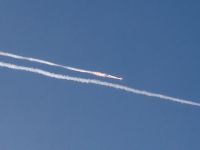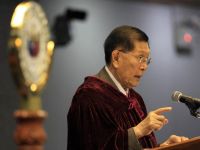Western hopes that Bosnians could turn their backs on past ethnic divisions appeared to be premature Tuesday as early results from the country's third general elections showed nationalist forces in the lead.
"With such a constellation of political forces, Bosnia remains the hostage of national division", the Sarajevo daily Oslobodjenje said in its commentary on Saturday's polls, which had been tipped to bring democratic changes to the post-war country.
Results based on one third of the ballots counted and released Monday by Organization for Security and Cooperation in Europe (OSCE) monitors revealed that Bosnia's Serb, Muslim and Croat nationalist parties led the race.
The multi-ethnic Social Democrat Party (SDP), which had been embraced by the West as Bosnia's best hope for ethnic harmony, had a much stronger showing than in previous elections but failed to take the lead in the Muslim-Croat half of the country as expected.
"The stakes were high: financial and political support and European integration" if nationalists were snubbed, said Oslobodjenje, or "isolation and poverty" if they won out.
The international community, after pouring 5.1 billion US dollars of aid into the war-torn Balkans state, has also warned that Bosnia could be politically and economically isolated if nationalists win the polls.
The West hoped this year's democratic changes in neighboring Croatia and Yugoslavia, which both supported Bosnian Croat and Serb hardliners during the 1992-95 war, could spill over to Bosnia.
But these hopes appear to have fallen short, and the war-time wounds of the three ethnic groups who all fought against each other during the bloody conflict which claimed more than 200,000 lives, seem to be taking longer than expected to heal.
The former war-time foes have continued to struggle for their national interests by blocking the work of joint institutions.
The US-brokered Dayton peace agreement signed in 1995 left the country divided between two entities -- the Bosnian Serbs' Republika Srpska (RS) and the Muslim-Croat Federation -- linked by a weak central institutions.
Saturday's polls were for the central parliament, lawmakers for the two assemblies and for the post of RS president.
One of the reasons for Bosnian Serbs' strong support for the nationalist Serb Democratic Party (SDS) was the failure of the Western-backed moderate leader, Milorad Dodik, to ease economic hardship, the focus of the SDS' campaign.
The SDS, founded by Bosnian Serb warlord and indicted war criminal Radovan Karadzic, shifted its pre-election rhetoric from the protection of national interest to pledges to rebuild the collapsing economy.
US ambassador to Bosnia Thomas Miller told reporters here late Monday that Washington was dissatisfied with the SDS as "we do not see the actions equalling the words".
And calls for the creation of a Bosnian state without the two entities, launched by popular Muslim politician Haris Silajdzic and his Party for Bosnia-Hercegovina, alarmed Serbs, who feared they could lose the autonomy they enjoy within the RS.
Controversial rules for the indirect election of the upper house of the Muslim-Croat federation, imposed by the OSCE shortly before the polls, triggered a well-supported Bosnian Croat "referendum" on whether Croats should also have their own political, cultural and other institutions throughout the country.
The unofficial "referendum" crystallized Croat support around the main nationalist Croat Democratic Union (HDZ).
In a knee-jerk reaction, and fearing a rise in Serb and Croat nationalism, Bosnian Muslims who had shown strong support for the multi-ethnic SDP in last April's local elections switched their allegiance to ethnic-based parties, analysts said -- SARAJEVO (AFP)
© 2000 Al Bawaba (www.albawaba.com)







